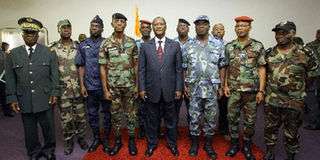Ouattara takes over in Cote d’Ivoire

photo | AFP
Cote d’Ivoire’s President Alassane Ouattara (centre) poses with General Philippe Mangou (third left), chief of staff of former pro-Laurent Gbagbo Defence and Security Forces (FDS), and other military officers during a ceremony at the Golf Hotel in Abidjan on Tuesday.
Abidjan, Wednesday
Cote d’Ivoire President Alassane Ouattara began to assert his new authority today by sending his captured rival Laurent Gbagbo to a secret location and restarting vital cocoa exports.
Seeking to heal a nation broken by a four-month crisis pitting him against his strongman predecessor Gbagbo, Ouattara also called on the International Criminal Court to probe massacres carried out in the west of the country.
“I will speak shortly with the ICC’s chief prosecutor so the court can begin investigations,” Ouattara told journalists during his first major press conference since being able to exercise executive power.
“These massacres are unacceptable... I am revolted,” he said.
Hundreds were killed in western Cote d’Ivoire after forces loyal to Ouattara swept through the country to Abidjan earlier this month to oust incumbent president Gbagbo who had refused to admit defeat in a November run-off vote.
Massacres were centred on the town of Duekoue and troops on both sides of the conflict accused of involvement.
Chief prosecutor Luis Moreno-Ocampo last week announced plans to launch a formal probe into mass killings in Cote d’Ivoire.
“I will do everything for these condemnations to set an example, not only for Ivorians, but also for Africa and the entire world,” Ouattara said, expressing hope the probe could be wrapped up “as quickly as possible.”
A spokesman for the United Nations mission in Cote d’Ivoire (UNOCI), which is safeguarding Gbagbo and his associates pending their trial for alleged crimes committed during the conflict, said he had been flown out of main city Abidjan.
“The helicopter transporting Laurent Gbagbo took off at 12.40pm heading to the north of the country,” Hamadoun Toure said, declining to elaborate on his exact destination.
Ouattara said earlier that the former leader had been moved from a hotel in Abidjan where he had been held since being arrested by Ouattara’s forces in a bunker on Monday.
“As I speak to you, Mr Laurent Gbagbo is no longer at the Golf Hotel, he is in Cote d’Ivoire, well secured,” Ouattara said. “Mr Laurent Gbagbo is a former head of state, he must be treated with consideration.”
The four-month stand-off pitting Gbagbo against Ouattara threatened to plunge the country back into civil war, with Gbagbo’s supporters largely controlling the south and Ouattara’s allied former rebels the north.
With the formerly wealthy nation divided and broken by the conflict, Ouattara said he had ordered an immediate resumption of cocoa exports from the world’s number one producer which were frozen by sanctions slapped on Gbagbo.
Asked when the vital exports would resume, Ouattara said: “Immediately.”
“I signed a decree yesterday, the port is under control. I named an interim port manager so everything is underway for cocoa to be sent out,” Ouattara said, referring to Abidjan’s export terminal.
Around 400,000 tonnes of cocoa have accumulated on the dockside in Abidjan and the southwestern port of San Pedro during the crisis.
Ouattara said he would move into the presidential palace, in a district that saw some of the fiercest battles during 10 days of fighting, “in the coming few days” despite insecurity still reigning in parts of Abidjan.
Rights group Amnesty International warned that Gbagbo’s supporters were at risk of violent reprisals, despite both Ouattara and Gbagbo having called for fighters to lay down arms.
Armed men, some wearing military uniforms, have been conducting house-to-house searches in neighbourhoods, including Yopougon and Koumassi, where supporters of Gbagbo are living, Amnesty said.
One eyewitness told Amnesty how a policeman belonging to Gbagbo’s ethnic group was taken from his house on Tuesday and shot dead at point blank range.
Sporadic clashes have erupted in Abidjan districts still loyal to Gbagbo and with looting rife in others after 10 days of bitter fighting, French Defence Minister Gerard Longuet said French gendarmes would patrol the city.
Fighting in Abidjan has left streets littered with bodies and parts of the city in the grip of looters.
But a semblance of normal life appeared to return to large parts of the city, with traffic back on the streets and some shops reopening. (AFP)




